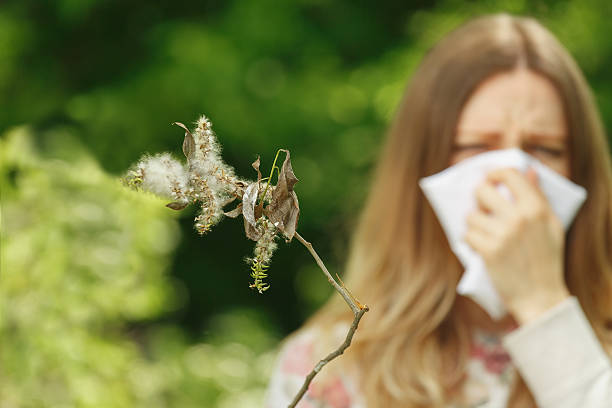In the quest for holistic treatments, many individuals are turning to acupuncture for allergies as a potential remedy. This ancient Chinese practice, deeply rooted in the principles of Traditional Chinese Medicine, offers a unique approach to alleviating allergy-related problems and symptoms associated with various types of allergies.
According to the comprehensive study of American Journal of Rhinology & Allergy of 13 randomized-control studies involving over 2,000 participants, those who underwent acupuncture treatments witnessed a significant reduction in nasal symptoms, a decreased reliance on medications, and a notable drop in serum immunoglobulin E (IgE) levels, which are antibodies often overproduced in response to allergens. Moreover, these individuals reported enhanced quality-of-life scores, underscoring the potential of acupuncture as a viable option to treat allergic reactions.
From understanding the underlying causes of allergies and their symptoms to discovering specific acupuncture points targeted for relief, this blog post will provide you with the information you need to understand the world of acupuncture and its potential benefits for allergy sufferers.
Understanding Allergies and Their Symptoms
Allergies occur when the immune system reacts to a foreign substance, such as pollen or pet dander, that doesn’t typically cause a reaction in most people. The immune system produces substances known as antibodies. When you have allergies, your immune system makes antibodies that identify a particular allergen as harmful, even though it isn’t. Exposure to the allergen can cause skin, sinuses, airways, or digestive system inflammation.
There are various types of allergies, including food allergies, drug allergies, and insect sting allergies. However, one of the most common types is seasonal allergies. Individuals often seek allergy treatment to manage these symptoms and develop immunity to allergens.
What is Seasonal Allergy?
Seasonal allergies, often referred to as hay fever or allergic rhinitis, are allergy symptoms that occur during certain times of the year, typically when outdoor molds release their spores and trees, grasses, and weeds release tiny pollen particles into the air.
What are the Symptoms of Seasonal Allergies?
Seasonal allergies, one of the many types of allergies, are often triggered by pollen from trees, grasses, and weeds. As plants release pollen into the air, individuals sensitive to these particles can experience a myriad of symptoms that can range from mild to severe. People with seasonal allergies experience 12 symptoms, including:
- Nasal congestion or stuffy nose
- Runny nose
- Sneezing
- Post nasal drip
- Loss of smell
- Cough
- Sore throat and throat irritation
- Watery, itchy, red, or puffy eyes
- Ear pressure
- Headache or sinus headache
- Fatigue
- Poor sleep
With the right approach, it is possible to control allergy symptoms, relieve allergy discomfort, reduce allergic sensitivity, and even get rid of allergy symptoms altogether.
How Does Traditional Chinese Medicine Define Allergies?
Traditional Chinese Medicine (TCM) offers a unique perspective on allergies. According to TCM, the human body is protected by a defensive energy known as “Wei Qi.” This energy circulates on the surface of our body and acts as a protective shield against external harmful elements, including allergens. When the Wei Qi is weak or imbalanced, it allows allergens to penetrate the body, leading to allergic reactions. Utilizing TCM for allergies provides an alternative approach, focusing on strengthening the Wei Qi to prevent and alleviate allergic symptoms.
How Does Acupuncture for Allergies Work?
Acupuncture, a cornerstone of traditional Chinese medicine, involves the insertion of thin needles at specific points on the body, known as acupuncture points. One of the primary ways acupuncture is believed to help with allergies is by boosting the immune system. By targeting specific acupuncture points for allergies, practitioners can stimulate the body’s defensive energy, known as Qi. This not only helps in alleviating symptoms but also in reducing the body’s sensitivity to allergens over time.
Studies have found that allergy sufferers who undergo acupuncture to treat allergies experience a significant reduction in symptoms and use antihistamines less often than those who do not. Acupuncturists target specific points according to the patient’s unique symptoms and needs. For example, when treating allergies, they usually focus on points located on the front of the body. Stimulating these points helps regulate blood flow and strengthens the body’s defense Qi, increasing immunity and reducing allergic reactions.
Acupuncture Points for Allergies
Utilizing acupuncture for allergy relief involves addressing the body’s energy pathways. Imbalances in these pathways can lead to allergic reactions. By targeting specific acupuncture points, practitioners aim to stimulate energy flow and maintain physical balance, thereby reducing symptoms and enhancing the effectiveness of acupuncture for allergy management.
Large Intestine 11 (LI11)
LI11, located at the outer end of the elbow bend, is often used to eliminate toxins and clear heat from the body. It is believed to be beneficial for conditions with symptoms of heat and inflammation. It is often used in acupuncture treatments for allergies, especially when symptoms include skin rashes or hives.
Stomach 36 (ST36)
ST36, a vital point in acupuncture for allergies, is located on the lower leg, about four finger widths below the kneecap. It is one of the most commonly used acupuncture points and is believed to increase overall energy and strengthen the immune system. ST36 can help fortify the body’s defense energy for allergy sufferers, potentially reducing allergic reactions.
Lung 7 (L7)
L7, punctuated on the inside of the arm above the wrist, holds significance in traditional Chinese medicine. The lungs are closely associated with the immune response, and L7 is often tapped to soothe nerves and bolster the lungs, opening the airways. This point proves particularly beneficial for those grappling with allergic asthma or respiratory symptoms.
Bladder 2 (UB2)
UB2, located at the inner end of the eyebrow, is often used to have analgesic effects and alleviate head pain and symptoms, such as sinus congestion, itchy eyes, and headaches. This point is especially prevalent in acupuncture for seasonal allergy treatments, making it a go-to for those suffering from hay fever and similar conditions.
Large Intestine 20 (LI20)
LI20, situated on both sides of the nostrils, is often used to increase circulation and address nasal symptoms such as congestion, runny nose, and sneezing. Acupuncturists aim to open the nasal passages and relieve sinus-related allergy symptoms by targeting this point.
Large Intestine 4 (LI4)
Located on the back of the hand between the thumb and index finger, LI4 is a versatile acupuncture point used for a variety of conditions. It is believed to reduce stress and regulate organ functions for allergies, helping to alleviate symptoms such as headaches and sinus congestion.
Liver 2 (LR2)
LR2, an essential point in acupuncture for allergy, is located on the top of the foot, between the first and second toes. In traditional Chinese medicine, the liver is associated with the smooth flow of energy and emotions throughout the body. LR2 is often utilized to provide relaxation and balance energy flow, aiding in clearing liver heat. It is frequently used for allergic reactions, especially when accompanied by emotional symptoms like irritability.
Creating an Allergy Treatment Plan
At the Eternal Health & Wellness Clinic, we adopt a holistic approach to allergy treatment. Patients seeking relief often look into acupuncture for allergy reviews and can anticipate a combination of acupuncture and other supportive therapies tailored to their unique needs at our clinic. Our commitment is to provide comprehensive care, ensuring each individual receives a personalized treatment strategy. By integrating traditional and modern methods, we aim to address the root causes of allergies, offering lasting relief and improved well-being.If you’d like to alleviate your allergy symptoms and improve your quality of life, go ahead and schedule an appointment now. We welcome you to our clinic!
Frequently Asked Questions
Does Acupuncture Work for Allergies?
Acupuncture allergy treatment provides relief for allergies. Studies have shown that seasonal allergy and eczema patients report an improvement in their quality of life after receiving this specialized treatment for their symptoms.
How Many Acupuncture Sessions for Allergies?
The number of acupuncture sessions required to accelerate healing from allergies varies according to individual needs and the severity of symptoms. Some people experience long-lasting relief after just one session, while others may require multiple sessions over 4-6 weeks to re-regulate the body’s immune system response.
Can Acupuncture Help with Allergies?
Acupuncture for allergy elimination strengthens immunity by circulating the body’s energy and stimulating defense Qi. This natural healing reduces allergic reactions, relieving symptoms such as runny nose, itchy eyes, inflammation, and eczema.

